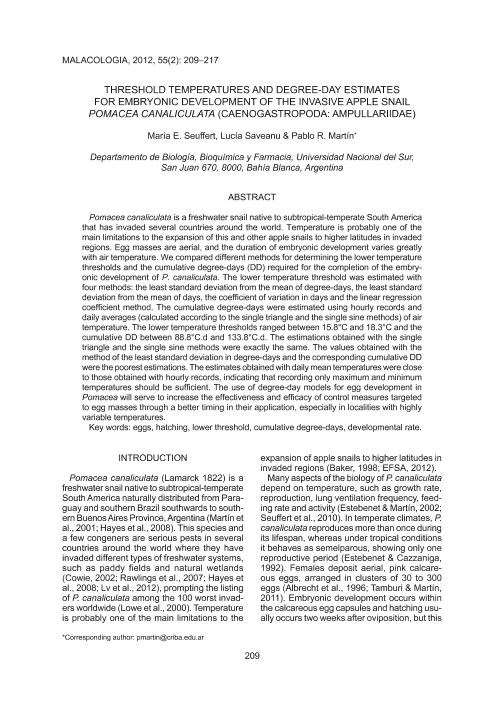Mostrar el registro sencillo del ítem
dc.contributor.author
Seuffert, Maria Emilia

dc.contributor.author
Saveanu, Lucía

dc.contributor.author
Martín, Pablo Rafael

dc.date.available
2018-09-21T21:50:18Z
dc.date.issued
2012-12
dc.identifier.citation
Seuffert, Maria Emilia; Saveanu, Lucía; Martín, Pablo Rafael; Threshold temperatures and degree-day estimates for embryonic development of the invasive apple snail Pomacea canaliculata (Caenogastropoda: Ampullariidae); Institute of Malacology; Malacologia; 55; 2; 12-2012; 209-217
dc.identifier.issn
0076-2997
dc.identifier.uri
http://hdl.handle.net/11336/60684
dc.description.abstract
Pomacea canaliculate is a freshwater snail native to subtropical-temperate South America that has invaded several countries around the world. Temperature is probably one of the main limitations to the expansion of this and other apple snails to higher latitudes in invaded regions. Egg masses are aerial, and the duration of embryonic development varies greatly with air temperature. We compared different methods for determining the lower temperature thresholds and the cumulative degree-days (DD) required for the completion of the embryonic development of P. canaliculate. The lower temperature threshold was estimated with four methods: the least standard deviation from the mean of degree-days, the least standard deviation from the mean of days, the coefficient of variation in days and the linear regression coefficient method. The cumulative degree-days were estimated using hourly records and daily averages (calculated according to the single triangle and the single sine methods) of air temperature. The lower temperature thresholds ranged between 15.8°C and 18.3°C and the cumulative DD between 88.8°C.d and 133.8°C.d. The estimations obtained with the single triangle and the single sine methods were exactly the same. The values obtained with the method of the least standard deviation in degree-days and the corresponding cumulative DD were the poorest estimations. The estimates obtained with daily mean temperatures were close to those obtained with hourly records, indicating that recording only maximum and minimum temperatures should be sufficient. The use of degree-day models for egg development in Pomacea will serve to increase the effectiveness and efficacy of control measures targeted to egg masses through a better timing in their application, especially in localities with highly variable temperatures.
dc.format
application/pdf
dc.language.iso
eng
dc.publisher
Institute of Malacology

dc.rights
info:eu-repo/semantics/openAccess
dc.rights.uri
https://creativecommons.org/licenses/by-nc-sa/2.5/ar/
dc.subject
Cumulative Degree-Days
dc.subject
Developmental Rate
dc.subject
Eggs
dc.subject
Hatching
dc.subject
Lower Threshold
dc.subject.classification
Otras Ciencias Biológicas

dc.subject.classification
Ciencias Biológicas

dc.subject.classification
CIENCIAS NATURALES Y EXACTAS

dc.title
Threshold temperatures and degree-day estimates for embryonic development of the invasive apple snail Pomacea canaliculata (Caenogastropoda: Ampullariidae)
dc.type
info:eu-repo/semantics/article
dc.type
info:ar-repo/semantics/artículo
dc.type
info:eu-repo/semantics/publishedVersion
dc.date.updated
2018-09-11T18:14:02Z
dc.identifier.eissn
2168-9075
dc.journal.volume
55
dc.journal.number
2
dc.journal.pagination
209-217
dc.journal.pais
Estados Unidos

dc.journal.ciudad
Filadelfia
dc.description.fil
Fil: Seuffert, Maria Emilia. Consejo Nacional de Investigaciones Científicas y Técnicas. Centro Científico Tecnológico Conicet - Bahía Blanca; Argentina. Universidad Nacional del Sur. Departamento de Biología, Bioquímica y Farmacia; Argentina
dc.description.fil
Fil: Saveanu, Lucía. Consejo Nacional de Investigaciones Científicas y Técnicas. Centro Científico Tecnológico Conicet - Bahía Blanca; Argentina. Universidad Nacional del Sur. Departamento de Biología, Bioquímica y Farmacia; Argentina
dc.description.fil
Fil: Martín, Pablo Rafael. Consejo Nacional de Investigaciones Científicas y Técnicas. Centro Científico Tecnológico Conicet - Bahía Blanca; Argentina. Universidad Nacional del Sur. Departamento de Biología, Bioquímica y Farmacia; Argentina
dc.journal.title
Malacologia

dc.relation.alternativeid
info:eu-repo/semantics/altIdentifier/url/http://www.bioone.org/doi/abs/10.4002/040.055.0203
dc.relation.alternativeid
info:eu-repo/semantics/altIdentifier/doi/http://dx.doi.org/10.4002/040.055.0203
Archivos asociados
